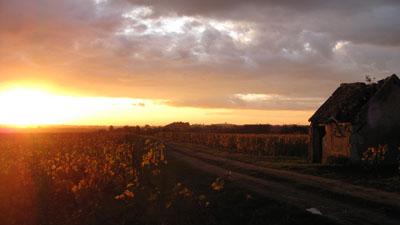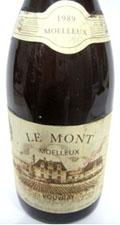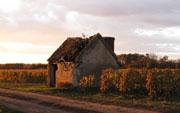Huët Moelleux 1989 and 1976
Majestic Chenin Blanc
with Impeccable Provenance
A short (and sweet) offer to ring in the New Year
Huët is a name that resides on the shortlist of the great winemaking families of the world. Though Vouvray has been famously under-appreciated in the U.S., Huët’s Vouvrays have always been recognized as some of the greatest, most complex and ageable white wines in the world.
While new vintages are sought after; older vintages are exceedingly rare, and prices continue to rise, especially recently, when the Domaine increased "cellar door" prices on all back vintages considerably.
We've been on the hunt for a well-priced and well-cellared parcel of Huets since our original ex-cellars offering a few years ago, and when we unearthed a small collection of wines -- all purchased on release -- in the cellar of a revered European restaurant, we jumped at the opportunity and grabbed them.
This is a rare chance to experience the labyrinthine complexity and delicate tip-toe finesse that Vouvray attains with the proper aging and storage, at very sharp pricing!
 |
On Decanter Magazine’s list of the "Top Ten Wines to Drink Before You Die," Huët is amongst the stratospheric legends like Mouton Rothschild, Latour, and Cheval Blanc as well as a handful of top wines from Domaine Romanee Conti. The catch, of course, with these wines is their expense -- at hundreds (and thousands) of dollars per bottle, they are out of reach for many collectors. For the same price of a single bottle (or a fraction of a single bottle) of these other legends, you could own an entire case of Huet!
Both the 1976 Moelleux and 1989 Molleux 1er Trie bottlings are exceptional opportunities to try the best Vouvray in the world from top vineyard sites, and experience its almost infinite growth and transformation. The 1976 is beginning to drink beautifully and will do so for the next 10+, while the 1989 1ers will continue to improve for the next 25+ years.
These wines are the absolute pinnacle of Vouvray and Chenin Blanc, and they are also exceptional values given their quality, rarity and very importantly, their pristine condition. I would love those of you who have not experienced a great vintage of Huët under optimal conditions to be able to do so. (Those who are familiar with Huëts will undoubtedly be the first to respond to this email!).
Due to the scarcity of these wines, each bottling will be sold on a first-come, first-served basis. Simply respond to this email or give us a call as soon as you can at (212) 980-9463.
Ian McFadden
Director of Fine and Rare Wine
Crush Wine & Spirits
 |
1976 Clos du Bourg Moelleux
This is a BIG vintage in the Loire (as it was in Burgundy, Germany, etc) - a hot and dry summer resulting in an early harvest of super-ripe grapes. Expect this wine to be flashy and fleshy - an opulent, rich wine that is in prime drinking form.
1989 Clos du Bourg Moelleux 1er Trie
An awesome vintage - do not miss. Writes Michael Broadbent: "A superb vintage...on par with 1947."
1989 Le Mont Moelleux 1er Trie
An awesome vintage - do not miss. Writes Michael Broadbent: "A superb vintage...on par with 1947."
All Huët is Pre-arrival, Arriving Spring 2010
Net / No Further Discount
Le Mont
This is an 8 hectare (~20 acre) plot purchased in 1957. The soil is largely clay and pebbles, making wines that are usually thought of as more elegant and feminine.
Le Clos du Bourg
The "Bourg" is about 6 hectares (~15 acres). The land was purchased by the Huët family in 1963. A very thin soil covers a limestone mass, and the vineyard is sometimes considered to have the best terroir. The wines are rich and powerful. This vineyard has been farmed as long ago as the 7th century when it was owned by the collegiate church of St. Martin de Tours.
Gaston Huët is often thought of as the "grandfather" of Vouvray. If that's too poetic for you, then just think of him as the Mayor of Vouvray - since he was for 38 years!
Though the Huët vineyards are now farmed biodynamically, neither Gaston nor Noel are particularly dogmatic about the teaching's philosophies. Rather, they came to biodynamics by testing a parcel of their land. When they found that the grapes from this parcel created superior wines, they simply switched.
Gaston did note, however, that after the estate changed to biodynamics the wildlife of the vineyard returned (in addition to employing organic farming, biodynamics believes in using natural predators to control disease and pests). Wild tulips returned; grass began to grow between the vines, providing food for the rabbits that had once attacked the vines.
Though Gaston died in 2002, an extremely traditional method of winemaking is still employed at the estate under Gaston's son-in-law Noel Pinguet. The wine is fermented in chestnut demi-muids which were bought used in the 1930s by the estate. Wild yeasts are employed, and fermentations may last as long as 2 months or more. The still Vouvrays are never chaptalized and malolactic fermentations do not take place because the caves are too cold and the natural acidity in the wine is very high.

